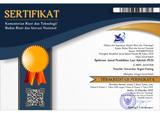Parents' Parenting Pattern Description Ofslow Learner Children In Pandemic Situation Coronavirus Disease 19
 ), Nadhirotul Laily(2), Muhimmatul Hasana(3),
), Nadhirotul Laily(2), Muhimmatul Hasana(3), (1) Universitas Muhammadiyah Gresik
(2) Universitas Muhammadiyah Gresik
(3) Universitas Muhammadiyah Gresik
 Corresponding Author
Corresponding Author
DOI : https://doi.org/10.24036/spektrumpls.v10i2.116988
Full Text:
 Language : en
Language : en
Abstract
References
Adawiah, R. (2017). Pola Asuh Orang Tua dan Implikasinya Terhadap Pendidikan Anak: Studi Pada Masyarakat Dayak di Kecamatan Halong Kabupaten Balangan. Jurnal Pendidikan Kewarganegaraan, 7(1). Retrieved from https://www.neliti.com/publications/121261/pola-asuh-orang-tua-dan-implikasinya-terhadap-pendidikan-anak-studi-pada-masyara#cite
Amelia, W. (2016). Karakteristik dan Jenis Kesulitan Belajar Anak Slow Learner. Jurnal Ilmu Kesehatan Aisyah, 1(2).
Amla, R., Ismaniar, I., & Sunarti, V. (2018). Gambaran Cara Orang Tua dalam Membentuk Kebiasan Belajar Menurut Anak di Jorong Alamanda Kenagarian Kinali Pasaman Barat. Spektrum: Jurnal Pendidikan Luar Sekolah (PLS), 1(1), 99. https://doi.org/10.24036/spektrumpls.v1i1.9513
Barnadib, I. (1996). Filsafat Pendidikan Sistem dan Metode. Yogyakarta: Andi Offset.
Baumrind. (1991). The Influence of Parenting Style on Adolescent Competence and Substance Use. The Journal of Early Adolescence,.
Firdausi, R., & Ulfa, N. (2022). Pola Asuh Orangtua Terhadap Perkembangan Emosional Anak di Madrasah Ibtidaiyah Nahdlatul Ulama Bululawang. MUBTADI: Jurnal Pendidikan Ibtidaiyah, 3(2). Retrieved from http://ejournal.iainmadura.ac.id/index.php/ibtida/article/download/5155/2895
Hadi, F. R. (2016). Proses Pembelajaran Matematika Pada Anak Slow Learnes (Lamban Belajar). Premiere Educandum: Jurnal Pendidikan Dasar Dan Pembelajaran, 6(01). Retrieved from http://e-journal.unipma.ac.id/index.php/PE/article/view/295
Hurlock, E. B. (2013). Perkembangan Anak (6th ed.). Jakarta: Erlangga.
Jamaris, M. (2018). Anak Berkebutuhan Khusus. Bogor: Ghalia Indonesia.
Nurfadhillah, S., Anjani, A., Devianti, E., & Nursiah. (2021). Lamban Belajar (Slow Learner) dan Cepat Belajaar (Fast Learner). PENSA: Jurnal Pendidikan Dan Ilmu Sosial, 3(3). Retrieved from https://ejournal.stitpn.ac.id/index.php/pensa/article/download/1541/1090/
Rahayu, N. S., Elan, E., & Mulyadi, S. (2021). Analisis Penggunaan Gadget Pada Anak Usia Dini. Jurnal PAUD Agapedia, 5(2). Retrieved from https://ejournal.upi.edu/index.php/agapedia/article/download/40743/17075
Sari, P. P., Sumardi, S., & Mulyadi, S. (2020). Pola Asuh Orang Tua Terhadap Perkembangan Emosional Anak Usia Dini. Jurnal PAUD Agapedia, 4(1). Retrieved from https://ejournal.upi.edu/index.php/agapedia/article/download/27206/12657
Sari, W. P., Aini, W., & Sunarti, V. (2018). Gambaran Pengasuhan Orang Tua Terhadap Anak di Kampung Sungai Sirah Kecamatann Sutera Kabupaten Pesisir Selatan. SPEKTRUM Jurnal Pendidikan Luar Sekolah (PLS), 1(2). https://doi.org/10.24036/spektrumpls.v1i2.9039
Surbakti, K. (2017). Pengaruh Game Online terhadap Remaja. Jurnal Curere, 1(1). Retrieved from http://www.portaluniversitasquality.ac.id:5388/ojssystem/index.php/CURERE/article/viewFile/20/22
Utami, R. B. (2008). Pengaruh Tingkat Pendidikan dan Tipe Pola Asuh Orang Tua Terhadap Perkembangan Psikososial Anak Prasekolah di Taman Kanak-Kanak Aisyiyah II Nganjuk. Universitas Sebelas Maret.
 Article Metrics
Article Metrics
 Abstract Views : 252 times
Abstract Views : 252 times
 PDF Downloaded : 74 times
PDF Downloaded : 74 times
Refbacks
- There are currently no refbacks.

This work is licensed under a Creative Commons Attribution-NonCommercial 4.0 International License.



